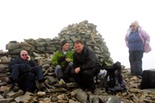
Firstly, a salute to my fellow travellers:
Our little group comprised a retired couple from Essex, England, a property developer from Victoria, Australia, and me (a semi-retired GP and tutor from Western Australia). Without seeming to have much in common, we quickly developed a bond as a result of our astonishment at the inefficiency and errors of the tour company. Fortunately, we all found considerable amusement in the ridiculous nature of our situation (apart from one day when I suffered a critical loss of jollity), and we were able to cope with the constant changes with the minimum of muttering.
My thanks to Anne, David, and Andrew for making the week far more enjoyable than it might have been, and for being such good sports.
How NOT to Run a Tour Company
In order to save their blushes (and to avoid libel lawyers), I won’t name the tour company which prompted these notes. However, if anyone is curious enough to try to work it out, and if one of the possibilities has a name which combines Scotland with the Australian Aboriginal word for a walking journey, then that’s probably the one.
Let’s start with the itinerary.
I imagine this is what helps most people choose one company from the others, and it was certainly the case for my companions and myself, because of the enticing combination of non-standard rail travel, a variety of easy-moderate walks, and accommodation in interesting locations. So it’s probably not a good idea to make radical and unannounced changes after the clients have paid in full, and it’s definitely not good for customer relations to make further changes without consultation during the actual trip.
Then there are the guides.
It’s understandable that a small company might have to switch its staff around at short notice, but if you advertise that a railway historian will be leading a railway-based tour, you probably shouldn’t replace him at the last minute with someone who doesn’t even know where to find timetables.
Clients also dislike being treated as a human version of “pass the parcel”, being handed on from one guide to the next like relay batons, particularly when these mysterious transfers occur without notice or explanation.
And finally, it would seem to be fairly basic common sense to ensure that the guide (even one hired at the last minute) is aware of the nature of the tour and the abilities and expectations of the clients. Having chosen a walking tour based on a commendably detailed assessment of one’s limited ability, it is very unsettling to find that the guide is used to leading mountaineering and snow climbing expeditions, and has virtually no idea of what “Easy to Moderate Hill Walking” means. In fact he was not even aware that this was the advertised grading of the tour until we asked him in some astonishment (after a particularly gruelling day) what we might have expected from a “Moderate” grade.
Support.
One attraction of “supported” walking tours is the heavily advertised fact that luggage is transferred by the company between overnight stops, leaving the walker to carry only a day pack. If poor planning and muddled transport arrangements mean that the clients have to carry/drag their own suitcases up and down stairs, across busy streets, around railway stations and on and off crowded trains and buses, perhaps the tour should be called “unsupported” instead, and clients advised to bring only what they can comfortably manage themselves.
It is then adding insult to injury to criticise the clients for having overly large suitcases, when a more appropriate response to the situation would be an apology and the provision of alternative arrangements. In fact these were often provided only after we objected very strongly to any more suitcase marathons.
Planning.
At least three of us had paid for our holidays in full, several months prior to the trip, so it is difficult to see why accommodation for at least three people could not be arranged in advance. But on several occasions we were told that the change in itinerary was because no bookings had been made, and on our last night the extraordinary arrangements were as follows:
• the guide stayed in the (very comfortable) hotel in the centre of town, close to where he decided we would have dinner
• I stayed in an understandably empty guesthouse with broken toilets and dirty showers, on the edge of town
• and the other three were in a comfortable but distant B&B which was 30 minutes walk away (no transport being provided, of course).
Finally, it certainly rubs clients the wrong way to charge them a large “Single Supplement” for travelling alone, and then five months later to place them in sub-standard accommodation because there were no single rooms left at better establishments. But that’s precisely what the Supplement is for - to cover the higher cost of a double room if necessary!
